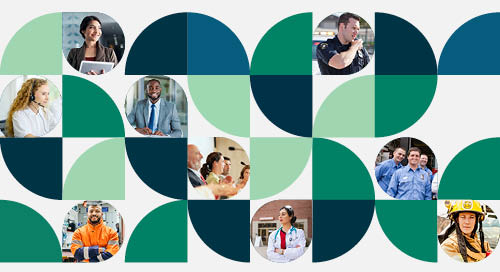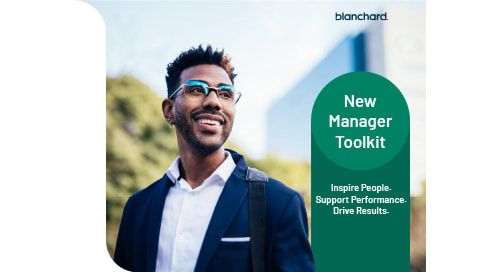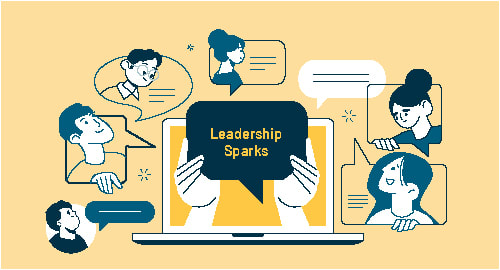I'll never forget my first experience as a manager. I was 19 years old, working in a hotel as a part of my hotel school experience at Cornell.
On my first day, my supervisor, Francisco, took me to lunch and said something I will never forget: “Scott, be careful when you're interacting with my people while you're at work at this hotel. Because the way you deal with people every single day becomes dinner conversation in their homes.
“I don't want people talking about work at dinner at all. And I certainly don't want them complaining to their family about the way you've treated them or the way I've treated them. So be very, very careful every single day about the way you treat people at work.”
Francisco’s message had a big impact on me. I never forgot what he said. In the decades since that first experience, I’ve learned much more as I’ve progressed through different leadership positions with The Ken Blanchard Companies, including my role as president for the past three years. My father and mother cofounded this company in 1979. Since then, we’ve trained in excess of five million managers in the concepts of One Minute Management and SLII® leadership development.
I’ll always remember what I learned during that first assignment: the outsized impact an immediate manager has on a person’s day. As a manager, if your people don’t feel valued, trusted, and respected—if they aren’t empowered or challenged, or if they don’t feel they're developing a good relationship with you—those feelings go beyond their work life into their personal life. And you become the person they're talking about at the dinner table.
I’m sure I’ve been the topic of dinner conversations during my time as president of our company. We’ve certainly been through a lot together—first came COVID, which upended our business when all classroom training was canceled and we needed to do a complete retooling of our offerings to meet the demand for virtual training. Then, most recently, came the rapid development of new products and services to match the needs of a digital-first learning and development landscape.
Leadership Principles for Tomorrow
In a presentation for the ATD23 international conference later this month, my father and I will be conducting a session where we look at some of the human-centered principles required to successfully lead in the future. My dad will share his leadership principles in a blog next week. Here are the areas where I think we need to focus. See how this matches up with your experience.
Leaders must have their people’s backs: This is about assuring people that, no matter what, they can count on you as leader to be forthright and fair. People sense when you are not there for them. Without people’s trust, you cannot lead them.
Being human, we bring our whole selves to work. Some of things we think about when we come to work are: What is this organization I'm working for? Who is this person I’m reporting to? What do I think and feel about my employer? What job am I being asked to do? To what degree am I prepared with everything I need to do the job? Can I win in this job? Does it feel safe emotionally and physically? Who are these people I'm working with and what is the quality of those relationships?
These things really matter because as human beings, we were designed to seek safety and to be alerted to danger. A lot of times, people’s antennas are up because they're worried about either their job or who they're working with.
In order for people to operate efficiently, they need to feel they are safe and part of a trusting relationship. They need to feel valued as human beings. They need to feel that what they're doing is useful and that it matters. When those conditions are in place, people become their best selves.
Our research into Employee Work Passion and The Leadership-Profit Chain has shown that when people perceive an increased sense of well-being at work, they respond with intentions to perform their job at a high level, apply discretionary energy, cooperate with other people inside and across boundaries, say positive things about the organization, and stay with the organization.
But if they don't feel safe, none of those things are going to happen in any sustainable way.
Leaders must adapt to people and develop rapport with them—not the other way around: As a leader, you need to shift from judging direct reports to investigating what’s behind less than acceptable behavior. Your role is to build rapport and clear the way for people to be exceptional.
Our people need to know that we, as managers, are here to support their growth and development. That's a mindset people can feel.
From there, leaders need to develop the skills to actually support that mindset. This means listening before telling, asking questions before grilling people, and waiting for the right time to tell your truth or make a request or even a demand as a manager—always reinforcing the idea that we're in this together. Our job as managers is to help people win. Because if they win and the team wins, we all win.
Blanchard is all about helping leaders, managers, and organizations create a working environment that feels physically and emotionally safe. When that happens, people feel valued as human beings and are enabled to do work that matters, is useful, and is going to make a ding in the universe.
And as a leader, you have to take the first step. Because if you and your people don’t have a good connection, they're not going to be able to let their guard down and perform with any degree of predictability or any kind of satisfaction.
Learning as a leader is never over. Leadership is a journey, not a destination. Leaders must grow and change to meet the needs of the present and the near future.
The best organizations create a condition where people are all in—with their head, their heart, and their hands. Our clients expect their leaders to behave at their best. Our job is to help create insights or distinctions in leaders that last decades and fuel their effective behavior over time.
At Blanchard, we have a deep library of evolving content regarding leadership and work topics that matter. We have learning designs that meet people where they are in the flow of work so that they can have formal and informal experiences of learning the mindset as well as developing the skills required to lead people.
Everybody deserves to work for a manager who makes them feel great and helps them succeed. It's complicated and emotional to get leadership right in any organization, but to get it right in today’s environment is really tricky. It’s a labor of love for us. It’s what we do. And we're there with you to help figure it out and train your managers to have the right mindset and skills so that they can create a great environment where their people can succeed.
Make work something to talk about
People come to work with heads, hearts, habits, aspirations, and dreams they want to put to use. In many ways, it’s about making work not just palatable, but a rewarding part of their life.
I hope Francisco will forgive me for encouraging people to talk about work at the dinner table— if what they talk about is a wonderful experience rather than something they dread.
We can't separate out our humanity from what we do every day. For me, that idea was cemented in my first assignment. We all have aspirations. We all want to make things happen. So let’s make work something people want to talk about.
_________________________________________________________
Interested in attending a complimentary webinar on this topic? Join Ken Blanchard and Scott Blanchard on May 25 as they present 6 Enduring Principles of Leadership. The event is free, courtesy of The Ken Blanchard Companies.
Are you attending the ATD23 International Conference in San Diego May 21–24? Be sure to drop by the Blanchard booth and say hello.
About the Author
More Content by Scott Blanchard










